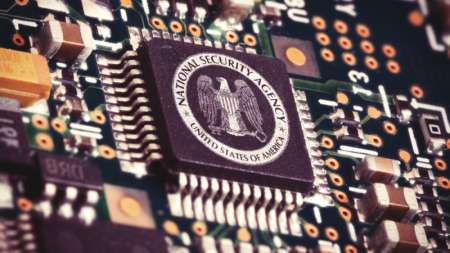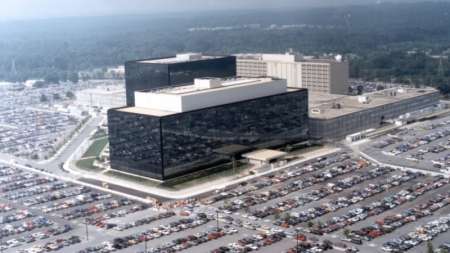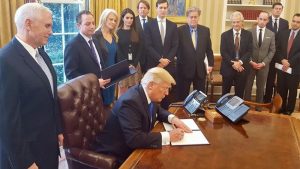A group of prominent technology companies wrote a letter to the chairman of the House Judiciary Committee, asking Congress to reform the National Security Agency’s surveillance powers. The technology companies include Adobe, Amazon, Cisco, Google, and Microsoft. […]
Rob Joyce, cybersecurity coordinator for the White House, has the opportunity to heal tensions between the intelligence community and the technology industry in the wake of the WannaCry ransomware attack. […]
The U.S. government workforce is not prepared to deal with the kind of information warfare that Russia used to influence the 2016 presidential election and has continued to use in the elections of other nations, U.S. Cyber Command and NSA Chief Admiral Michael Rogers told members of the Senate Armed Services Committee. […]
The National Security Agency announced last week that it will stop collecting Americans’ emails about foreign targets. However, this is a small amount of data compared to the rest of the information that the NSA collects. […]
Microsoft announced that it had already patched the vulnerabilities that were disclosed by the Shadow Brokers hacker group last week. […]
A group of Delaware National Guard officers crowd around a computer as code flashes down the screen. One of them thinks he found a back door that will enable him to access the administrator credentials to the Naval Academy’s networks. Once they have the credentials, they can access the school’s “token,” a piece of classified information that the academy has been assigned to protect. […]
Adm. Michael Rogers, head of the National Security Agency and U.S. Cyber Command, said that the section of the Foreign Intelligence Surveillance Act that allows the NSA to collect information on foreign nationals is “instrumental” in providing Congress with intelligence. […]
President Donald Trump picked National Security Agency official Rob Joyce to lead White House cybersecurity policy issues during a time when NSA surveillance powers are up for discussion and bad blood exists between the NSA and industry. […]
Adm. Michael Rogers, head of the National Security Agency and United States Cyber Command, envisions that Cyber Command should contract private companies to build cyber weapons in the next five to 10 years. […]
Several technology industry groups sent a letter to members of Congress last week asking them to discuss privacy implications if they choose to renew a section of the Foreign Intelligence Surveillance Act, which gives the National Security Agency broad powers to collect information on foreign citizens. […]
The National Security Agency approved both Windows 10 and Surface devices to be operated with classified workloads under the Commercial Solutions for Classified Programs list, Microsoft announced. […]
National Security Agency contractor Harold T. Martin III was indicted on charges of stealing 50 terabytes of classified data, which included information on sensitive counterterrorism operations. […]
If the National Security Agency and Cyber Command were to split, NSA Executive Director Corin Stone explained that any disagreements between the agencies would be decided by the secretary of defense and the director of national intelligence, to ensure fair judgment. […]
A draft cybersecurity executive order would mandate a review of the most critical U.S. cyber vulnerabilities, the principal cyber adversaries of the U.S., ways to incentivize cybersecurity measures in the private sector, and the capabilities of the DoD, DHS, and the NSA. […]
President Donald Trump released his Making Our Military Strong Again and America First Foreign Policy last week, which hint at potential changes to the Federal cybersecurity community. Trump’s administration has yet to include any more specific details about how the United States’ cyber capabilities will be used. […]
The Shadow Brokers, the hacker group that stole National Security Agency applications, are selling a package of Windows hacking tools. The group first began selling NSA tools, which looked to be about three years old, in August. The current software also dates back to three years ago. […]
Congress passed the National Defense Authorization Act of fiscal year 2017, which includes a provision to separate U.S. Cyber Command from the National Security Agency. Cyber Command would focus on developing cyber weapons and use them against adversaries online, whereas the NSA would focus on gathering intelligence in the digital sphere. […]
President-elect Donald Trump’s nomination for United States attorney general, Sen. Jeff Sessions, R-Ala., could have an impact on government surveillance power because of his full-fledged support of the National Security Agency’s spying authorities. […]
Edward Snowden, the NSA contractor responsible for leaking information about the U.S. government’s mass surveillance program in 2013, spoke about the impact that President-elect Donald Trump could have on online privacy: “What we need to start thinking about now is not how we defend against a President-elect Trump, but how we defend the rights of everyone everywhere.” […]
The hacker group the Shadow Brokers released files Monday alleging to show which foreign governments and organizations were under surveillance by the National Security Agency. The Shadow Brokers directly asked the U.S. government to pay for the remaining files to be returned. […]
The U.S. government is charging Harold T. Martin III under the Espionage Act after concluding that the National Security Agency contractor took home 50 terabytes of classified data. […]
The United States has to formulate a conversation about cybersecurity breaches by foreign actors, according to Adm. Michael Rogers, director of the National Security Agency, adding that the Federal government has confirmed that Russia was behind the hacks on the Democratic National Committee. […]
The U.S. law enforcement and intelligence communities will not be able to access information stored on Microsoft’s new German data centers, according to a former NSA official. […]
The FBI arrested a National Security Agency contractor in August and is investigating whether he stole and released computer codes that the NSA developed to hack into foreign governments’ networks, according to a New York Times report. […]
Yahoo last year produced a software program that would search customer emails for information specified by U.S. intelligence officials, according to a report by Reuters. Rep. Ted Lieu, D-Calif., condemned such actions, calling them “Big Brother on steroids.” […]
The investigation into the August hack of the National Security Agency’s cybersecurity tools is looking into a theory that a former NSA employee left the information on a remote server that the Russian hackers found, according to Reuters. […]
The future of cybersecurity in the government and beyond relies on finding the kernels of innovation potential within “crazy” ideas, according to experts. One such idea is to abandon the concept of passwords altogether. […]
Cisco and Fortinet are working to fix their security software after the alleged hack on the National Security Agency earlier this week. […]
The National Security Agency Research Directorate awarded three students at the Intel International Science and Engineering Fair. […]
The Obama administration is working on a plan to elevate the status of the United States Cyber Command and separate it from the National Security Agency. […]



























